Nanny McPhee Returns (2 page)
Read Nanny McPhee Returns Online
Authors: Emma Thompson

Isabel and Rory were married by the blacksmith, moved into Rory’s farm, and had three children called Norman, Megsie and Vincent. They were about to live happily ever after when a war broke out.
This, I regret to tell you, is typical of Real Life.
Just when you think everything’s fine and dandy, something happens and you have to ADAPT.
Adapting is not as much fun as eloping, although it can be character-building.
It certainly was for Isabel, Norman, Megsie and Vincent. Poor Rory Green had to go off in an itchy uniform not quite knowing where and not quite knowing when – or even if – he’d be back. It was ghastly.
The night before he left, Isabel (or Mrs Green as I’ll call her from now on) cooked his favourite meal. It was fried cheese, which is cheddar grated on to a tin plate, grilled till it’s melted, with a bit of vinegar or Worcestershire sauce tipped in and eaten with a heel of bread. The cheese always burns a little at the edges and these you
must
scrape off with a blunt knife and save until last because they are the best bits.
No one was very hungry.
They all scraped off their burnty bits and gave them to Mr Green. He ate them up and smiled and smiled, which was good of him because he was the least hungry of them all and actually felt more like crying than smiling.
‘Don’t forget to scratch the piglets,’ he said cheerily.
Ah.
Not the sort of thing you hear every day. Or maybe you do, what do
I
know? You might have the sort of dad who says things like ‘Don’t forget to scratch the piglets/cows/goats/ elephants’ all the time. Lucky you.
At any rate, it gives me the chance to tell you a bit more about Mr Green before he goes off because you might as well know exactly who you’re missing.
I expect you remember he’s handsome, impulsive and has the nicest smile ever. Unlike Mrs Green, he was born to parents who understood each other quite well and were very happy as a result. They were farmers and had two boys, Rory and Phil. As I keep telling you, families are weird. In spite of all their parents’ niceness, Rory and Phil were very different kettles of fish. Rory was kind, loving and imaginative. He could mend virtually anything and felt all sorts of things in his bones that turned out to be true, like when one of the new-born lambs was in trouble or when the cow slid into the river by mistake. Phil, on the other hand, was lazy, nervous and ambitious. He had no discernible talent for anything. Nobody’s fault, that’s just how he was. As a result, he was jealous of his brother and very keen to do things like put salt in his porridge, marmalade in his wellies and frogs in his bed.
Mr and Mrs Green worried about Phil’s behaviour but were too busy on their farm to find ways of helping him to change. So he was just left as he was.
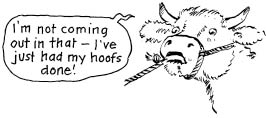
There is a cow in our story called Geraldine. She is being played by a film cow whose name is Beryl. She arrived on set an hour ago, took a violent dislike to the pretend mud and refused to leave her trailer. This is why they tell you never to work with animals. They are unpredictable. Also, one of my jackdaws has been naughty. In our film there is a jackdaw called Mr Edelweiss. Some of his bits will be computer-generated but a lot of his acting will be done by real jackdaws. The Animal Trainers (see you-know-what) and I have been working with three different birds for six weeks already. They are called Devil, Al and Dorian. It is Devil who has been naughty. Last night he caught a mouse (which wasn’t naughty) and ate it (which was). It means that overnight he put on 8 grams in weight which means that he can’t be fed today and consequently can’t work because he will only work for food. I had no idea jackdaws were such finely tuned instruments. Apparently if they eat too much they can’t fly or they explode or something.
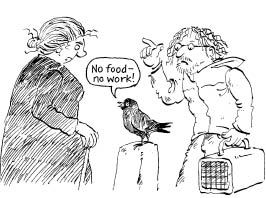
Martin Harrison is our First Assistant Director (see Glossary) and, apart from the Director, is really the most important person on the set. He’s just come up to me and said that when he first read the script he thought to himself, Oh, what a lovely simple story. He now realises that the lovely simple story is without a doubt the most complicated film he’s ever worked on. This is largely due to the preponderance of animals and children and also goes to prove once again that simple is never easy.
I am watching Oscar Steer, who, aged six, is our youngest actor apart from the piglets, who are only a month old. He is so clever and funny. He can even run in the mud.
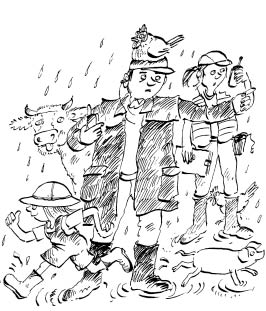
So now you know a bit about Phil and Rory. There’s just one other important thing I have to tell you. Rory adored his children and would spend hours making things for them. The best thing he’d ever made was a machine called the Scratch-O-Matic. He’d had the idea one long summer’s day as he was watching Vincent scratching the piglets with the end of a broom. Piglets love being scratched and they would jostle each other for position under Vinnie’s broom handle. Vinnie would try and scratch each piglet equally but inevitably the strongest ones would get the most attention and then it would be suppertime and Vinnie would have to go indoors complaining that the littlest piggies had been left out. Mr Green sat up all night with a huge bit of paper and a pencil, then spent an entire day in the barn sawing and hammering and occasionally letting out great bellows of rage when something had gone wrong with his calculations. Then he came in and went to sleep so soundly in front of the fire that Mrs Green just left him there for the night. In the morning, he was up and about before anyone, and when the rest of the family had come downstairs for breakfast, he proudly announced that he had something special to show them all. Consumed with curiosity, the children and Mrs Green followed him into the barn, where a sheet had been flung over a gigantic structure right in front of the pigsty. Pink with pride, Mr Green whipped away the sheet to reveal an amazing machine. It all started with a bicycle seat and pedals. You sat on the seat and pedalled, and all at once a great system of levers and cables whooshed into action. The cables controlled the levers, which controlled a selection of brushes and sticks and broom-handles which all moved about as music came out of a great gramophone horn. Each little pig was settled under a brush and scratched to its heart’s content as it listened to whatever music you fancied putting on to the record player, which is an old-fashioned term for a sort of iPod. All the children said the Scratch-O-Matic was the cleverest invention since sliced bread, and Vincent in particular thought it was the finest thing he’d ever seen in his life.
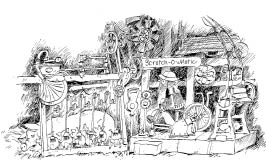
g
All this just goes to show that Mr Green was dad-tastic and the idea of him having to leave home and go off to fight and maybe even get hurt made them all thoroughly miserable.
On the morning of his departure, everyone saw him up to the top of the lane and waved him off as he disappeared round the corner. They shouted and jumped and made loads of noise. As soon as he’d gone from view everyone fell silent. Mrs Green looked at the three sad faces.
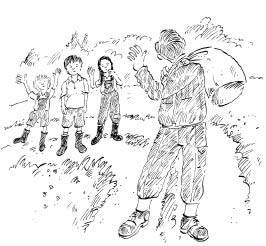
‘Come on,’ she said. ‘Dad’ll want something sweet when he comes home so let’s make him some strawberry jam. I’ve saved up sugar specially for it!’
This idea rather cheered the children up, so they went back home, picked strawberries and made a really gorgeous pot of jam for Mr Green’s return. Megsie made the frilly top and tied the ribbon and Vincent drew the label with more care than usual. Mrs Green put it in its own special corner of the pantry shelf. Every day from then on, Vincent would go and check to see it was safe and hadn’t been eaten by mice.
It’s Day Two and raining hard. No strawberries here, that’s for sure. All the wheels on the cameras and lights get stuck in the mud and we work at least 30 per cent slower than usual. Phil Sindall, our Camera Operator (see Glossary), is sitting on the Dolly (see Glossary) with his forehead resting on the eyepiece. He is meditating while he waits. There is no one who has to be more patient than a Camera Operator, and there is no Camera Operator more patient than Phil. It’s a bit like having Buddha on the set.
There’s absolutely nothing going on here.
I suppose I’d better just get on with the story.
The days and weeks went by and were filled with all the usual chores and with Mrs Green’s job. She worked at the village shop, which was owned and run by a frantically old lady called Mrs Docherty. It was a lovely shop, full of coloured drawers, and ladders in case you needed anything from ‘up top’. In the olden days, Mrs Docherty had colour-coded everything. Lentils went in the orange drawer, knicker elastic in the pink drawer and tap washers in the grey drawer, that sort of thing. But she had forgotten what colour was for what years ago and now everything was jumbled in, higgledy-piggledy. Mrs Green knew the shop inside out though and could always find you exactly what you wanted. She loved Mrs Docherty but had to admit that failing memory and eyesight did render her something of a liability. Mrs Green was apt to find soap snuggled in with oats (which had a slightly carbolic aftertaste as a result) and, on one occasion, rice mixed up with the ball-bearings. It wasn’t easy.
All the children wrote lots of letters to their father and so did Mrs Green, and they would normally get a lovely letter back, always from a different place. Once they had even got a letter from Africa, and Mrs Green had said to the children that at least it was nice that their dad was getting to see a bit of the world. But for the past few months, they had written and written and got no reply.
That morning, the postman had come to the door with a letter which caused huge excitement. But it wasn’t one of the little blue envelopes they were used to receiving from their father. It was a letter made of thick cream parchment paper, the sort of stuff you don’t expect to see except in castles. The writing on it was elegant and sloping and it smelled very faintly of bergamot.
All the children were very curious about it indeed and crowded about Mrs Green as she carefully opened the envelope.
‘Oh!’ she said, and sat back in her chair, staring at the beautiful paper in perplexity.
‘What, what?’ said Megsie. ‘Can I look?’
Mrs Green handed her the letter and explained to the others that her sister, Prunella (about whom you know so much but Norman, Megsie and Vincent knew next to nothing) was worried about bombs dropping in London and was going to send her two children to stay in the country with the Greens.
It was all very sudden.
Mrs Green was perfectly astonished because after she’d been cut off without a penny, she’d only seen her sister once. Prunella, who was now Lady Gray, had made the journey from London to the farm in a pale blue Rolls-Royce. When she’d arrived she’d been so appalled by the mud in the yard and the presence of grubby animals and germ-ridden poultry that she’d decided simply to roll down her window and chat to Mrs Green from the safety of the Rolls. This, as you can imagine, did not lead to a very intimate or sisterly conversation and, after a very short while, Prunella had rolled up her window again and gone back to London, overcome by what she saw as the squalor of her sister’s home. Mrs Green had been equally appalled by the ridiculously expensive car and the fact that Prunella had been wearing a sapphire tiara during the daytime.
She certainly hadn’t expected her sister to send her very own children to a place like Deep Valley Farm.
But so it appeared.
Megsie, Norman and Vincent were thrilled. New blood! People to play with! People to share the chores with! Rich people who might have access to chocolate!
‘When are they coming, then?’ asked Norman, pulling on his wellies, which, as usual, were damp inside. (I hate that.)
‘Next Tuesday,’ said Mrs Green, doing up Vincent’s shoelaces and putting on her coat inside out. ‘We’ll have to tidy.’